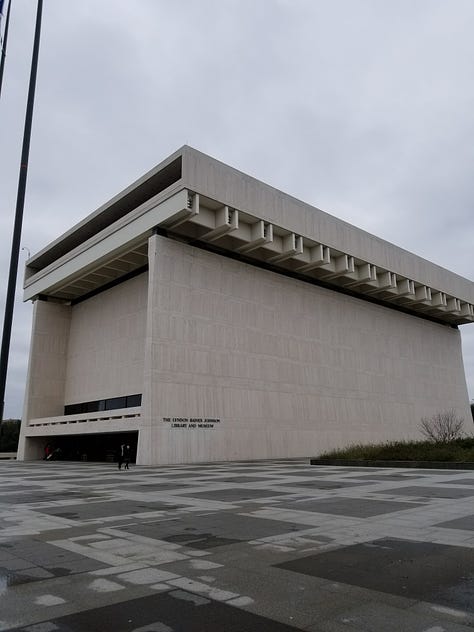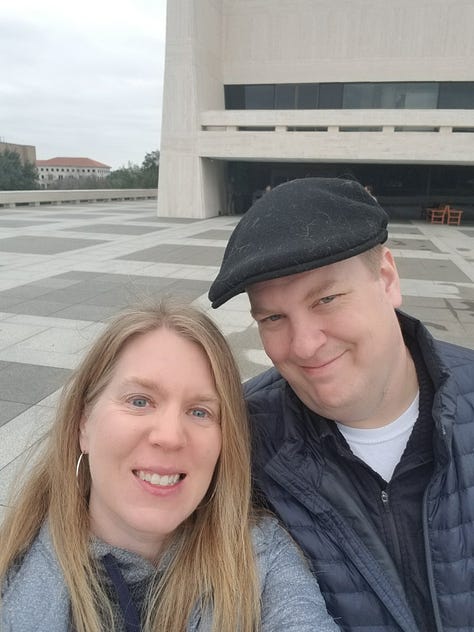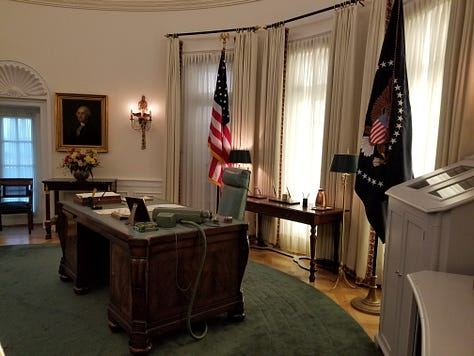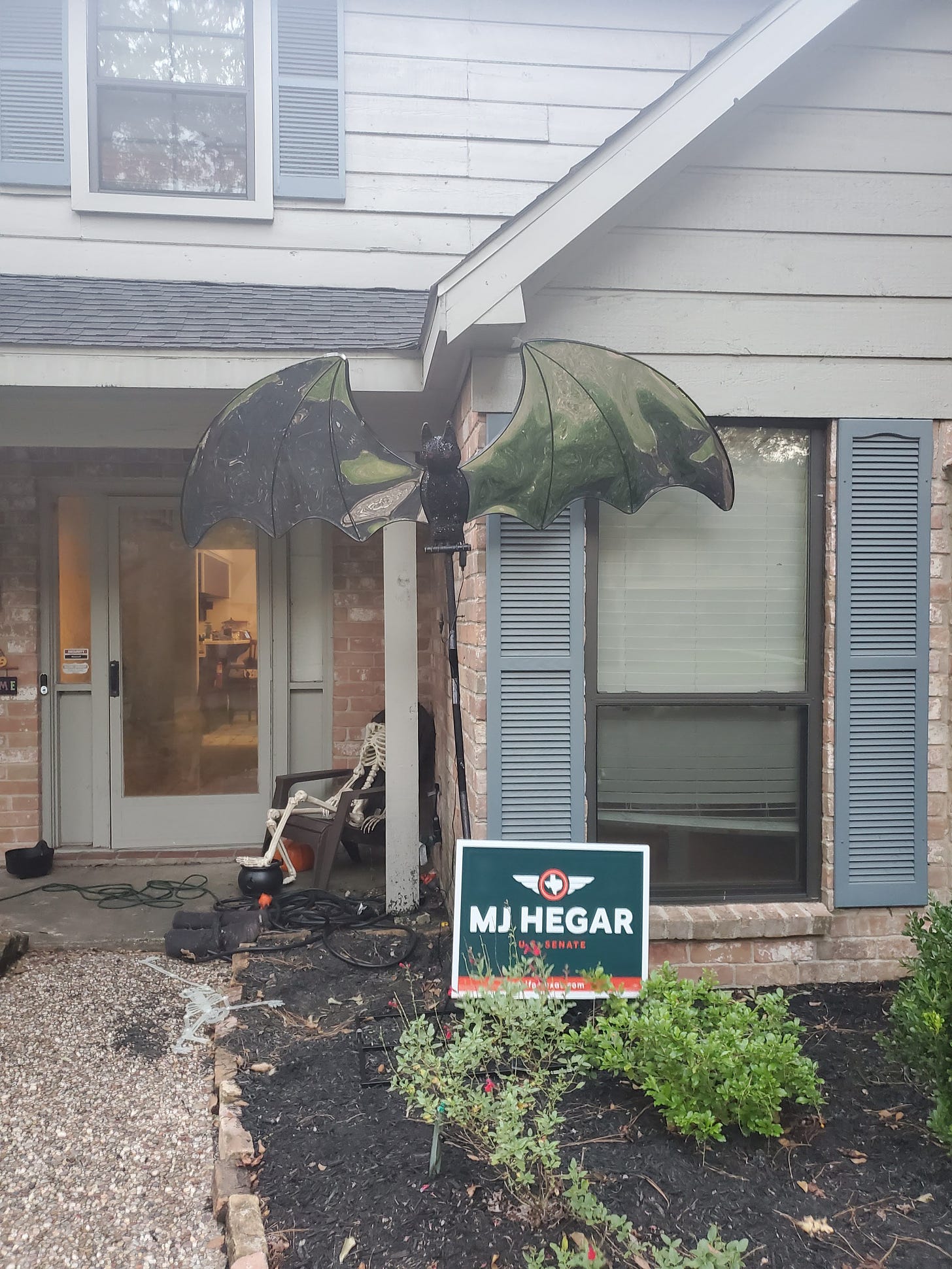Texas Politics Are Complicated
And they impact the whole country, so yes, they matter

My husband and I were both Midwestern-raised. We grew up in conservative Christian households with parents who, more often than not, followed the conservative Christian directives to vote for socially conservative politicians.
But nothing quite prepared us for our move to Texas.
We moved to Texas in the summer of 2015, just as Donald Trump was starting his presidential run. While we moved to the most diverse city in America, we quickly discovered our north Harris County residence put us square in middle of some of the most conservative areas of the city. I taught in a smaller town in north Harris County that was slowly becoming a larger Houston suburb as a result of urban sprawl, and many residents did not want to be city people. Many of the Texans I worked with didn’t like the encroachment of the city on their slower, conservative lifestyle. The world was changing too fast for them and it was changing without their permission. The proposal to “Make America Great Again” fit in with their concerns about daily life in the outskirts of the fourth largest city in the United States.
As a political moderate who didn’t comfortably fit into any political camp, I often found myself a fish out of water. My conservative Lutheran upbringing often married faith and politics, but over the years, my deep faith had me questioning some of the very conservative values I had been taught were essential to my Christianity. Yet I also lived, worked, and worshipped with faithful people who increasingly saw the world differently from me.
But I also felt my position as an outsider gave me a unique perspective on Texas politics. I didn’t see Texas history with the same unapologetic pride many of my friends did. I appreciated the diversity and complexity, well aware of the contradictions lifelong Texans were blind to. When my husband Jeff and I went to LBJ’s presidential library, we saw the story of a man who was as Texan as they come, and yet modern Texan conservatives were fighting against the very policies Johnson had fought to put into place.



The Bushes are nearly royalty in Texas. Our closest library was named the Barbara Bush Library. Texans showed up in droves to attend memorials and viewings when both Barbara and H.W. died. Older students at our children’s school got to skip an hour of classes to witness the passing of the train carrying the body of the 41st president of the United States to his final resting place in College Station on Texas A&M’s campus. Yet so many Texans have ignored Barbara’s strong endorsement of Hillary Clinton and critique of Donald Trump, and Barbara was no fan of Bill Clinton, even after he and George struck up an unlikely friendship during her son’s presidency.
Over six years living in Texas, we absorbed all of the complexities and contradictions of the Lone Star State. I even got brave enough to show public support for John Cornyn’s opponent in 2020.
Over time, we also came to understand just how important Texas politics are to the nation as a whole. The state becomes an easy punching bag for many around the country, as if all 30 million residents of the second largest state in the United States fit into a political monolith, but they don’t. But the reality is Texas politicians have shaped American policy. Texas is a border state, and the pressure on border towns matters to national discussions regarding immigration. Texas education materials often drive policy decisions in other states. And most recently, Texas’ abortion laws led to a Supreme Court decision obliterating Roe.
As a Midwestern outsider learning about the state through experience and exploration, I became more convinced than ever that understanding Texas politics didn’t just matter to me as a resident, but as an American citizen.
I quickly learned that understanding the diversity in Texas is essential to understanding the complexity of its politics. This diversity includes the biodiversity of the different landscapes, the economic diversity, the different needs of those living in cities and those in rural areas, and the ethnic and racial diversities ranging from the Tejanos who emigrated to Texas from Mexico before it claimed independence to the new immigrants from around the world working in energy, manufacturing, and education.
Texans are not naive or dumb. But they are stubborn and fiercely defensive of the state they call home. They see themselves as Texans first, American citizens second, a fact highlighted by the use of the Texas state pledge. They take great pride in their history, cling to the mythology, and the longer a family line has existed in Texas, the more deeply they feel the roots. The state has a deep history of racism, and yet it also takes pride in being the home of Juneteenth, celebrations throughout the state with a long tradition going on long before the rest of the country even knew it as an important historical event. The Latinos in the state are not a monolith, as many are Tejanos whose families have lived in Texas for generations. They don’t fit into a neat political box because being Texan is as much a part of their cultural history as being Latino or Hispanic.
The political contradictions in the state could be maddening to me as an outsider, but I also came to better understand that it wasn’t as simple as lack of education or racism or even a desire to stick it to their fellow Americans.
Texas has five major US cities but also 268,597 square miles of land; there are plenty of small towns more than thirty miles apart. When we traveled west, we had to plan our fuel stops, well aware that if we drove past a gas station we might not have another opportunity to fill up our truck for another 40-50 miles. Before we left for vacations, we planned our meals and ensured we had enough food to last us for our whole vacation. In many places in Texas, grocery shopping is a major task that must be handled intentionally. Access to high-speed internet is rare and cell phone service spotty. State politicians from small towns all over the state fight their party colleagues because they know school vouchers will hurt their public school systems.
West Texas is a rugged, difficult terrain. It is dry and open and vulnerable to climate extremes, from snowstorms to drought. The people of West Texas consistently vote for GOP candidates while in their personal lives being pragmatically progressive. They believe the Tim Walz ethic of “Mind your own damn business” while voting for candidates who do the exact opposite. They believe in the central role of the local church and importance of gun rights. They have embraced alternative energy with field after field of windfarms and homes covered in solar panels, but still vote for politicians clinging to the gas and oil that originally brought residents wealth.
Texas farmers are facing some of the biggest challenges in the country related to climate change. They don’t deny its existence because they are living with unnatural extremes in cold and heat, with flooding impacting those in the east and droughts impacting farmers all over the state. Yet oil and gas have kept the state’s economy running for over a century. Energy executives pay for the political campaigns of those representing rural areas and because those politicians also promote the traditional conservative values of their rural constituents, many feel they have to continue voting for those who are not looking out for their best interests.
But the citizens across Texas also have no alternative. They are not given choices in local and state elections. Until a few years ago, the Texas Democratic party had all but given up on fighting for those in rural and suburban Texas, often held back by the financial and emotional cost of fighting against established candidates. There are few Tim Walz’s standing up to say “I am progressive and I am one of you. I understand your needs and concerns for the future.” And because the Democratic Party has ceded control of rural areas to Republicans, the Republican trifecta has passed law after law to make it harder for those who want big change to vote or run for office.
Despite all of the challenges, the winds of change are blowing across Texas. The state of Texas produces more green energy than any other state in the union. And while California has far surpassed Texas in residential green energy use, the more people use and rely on solar and wind in the state, the more quickly it spreads. While oil and gas companies may try to continue their political hold on the state, the reality is, the scales are starting to tip out of their favor, which will inadvertently change the political landscape as well.
The Democratic party is also gaining more political power across the state. Like movements in other “red” states, more people are running in previously unopposed races and thanks to the efforts of politicians like Beto O’Rourke, more people are registering to vote in a state that has made it increasingly difficult to vote. While O’Rourke lost two major statewide races, his work has also knocked down barriers and excited the electorate. I have no idea what will happen in the 2024 senate race (I am writing this before the 2024 election), but Colin Allred is an excellent candidate who is far more Texan than Ted Cruz could ever hope to be. It is entirely possible he could win, which I know would shock the whole country.
Texas is a purple state waiting for its moment. And when that moment comes, I believe it will have a ripple effect across the entire country.
And I’ll excitedly watch it happen from my home in Indiana.
Support my writing
While most of my work here is free for all subscribers, it is still a labor of love that I fit into the few hours I have when I am not teaching or being an attentive wife and mom. If you would like to support my writing but do not want to commit to being a paid subscriber, please consider a one-time donation.
You can also support me by ordering my book or books from my favorite book lists at my Bookshop.org affiliate page.
Check out my RedBubble store for related merchandise.
If you want to be a regular supporter, you can upgrade your subscription from free to paid and get occasional content only for paid subscribers.
And thank you for supporting my journey 💗





Brilliant round-up of all things Texan. Well done